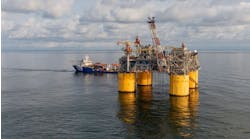Can the nationals survive?
Leonard Le BlancNational oil companies, which control most of the reserve and production capacity on the globe, have difficulty with sharp movements in commodity oil prices. Even Arab OPEC members with low lifting costs suffer. In contrast, some multinational producers, free marketers, and oil supply and price arbitrageurs take advantage of the profit and acquisition opportunities presented by large oil price swings.
The actions of these price opportunists, along with supply and demand complexity, will present lasting problems for concerted efforts of OPEC and non-OPEC producers to stabilize oil prices. Further, oil price swings and the global economy will make it difficult for national oil companies to survive as nationalized entities. The challenges are multi-fold:
- Revenue diversity: Countries that control domestic resources through nationalization frequently favor resource-based enterprises over more difficult-to-manage value-added enterprises, limiting diversity of revenue sourcing for them. Eventually, economic well-being is coupled almost exclusively to oil exports and prices.
- Efficiency: While sometimes present in upstream departments, efficiency is not easily obtainable in the downstream sectors of national oil companies. The reason is that in exchange for exclusivity of access, nationals must accept subsidization of domestic oil product prices and employment.
- Investment planning: Because of the way national oil companies are funded, internal planning must respond equally to government's economic condition and global oil price cycles. Planning becomes precarious when governments siphon off surplus cash flow during strong oil price conditions and cut operating budgets heavily when low oil prices dominate.
Wisely and subtly
Companies and entire industries often pay a penalty for violating unwritten rules for performance and conducting business in a responsible manner. Public derision over three oil spill incidents - Santa Barbara, Prince William Sound, and Campeche Bay (Ixtoc) - has resulted in long-lasting repercussions for the petroleum industry in North America, mostly in terms of limiting OCS access. When the industry tries to obtain relief from OCS restrictions, that dissatisfaction surfaces full tilt.Levering penalties against businesses for poor public performance is one thing, but doing so without adequate information, or scientific or statistical support, is something else. An example is the public's lack of understanding of the roles of oil tankers and production platforms, and the probability that if one is minimized, the other will expand. Also, if every liquid bulk tanker had to carry a huge sign indicating its contents, the public might decide that production platforms and pipelines are not so bad after all. There are other misunderstandings that seem to glide right over the heads of an otherwise literate public:
- Get rid of petroleum: Some environmentalists have been able to exploit anti-business public fantasies on this issue, which discounts economic dependence on cheap energy and the cost of oil's chemical substitutes. With inexpensive plastics, wraps, fibers, resins, and feedstocks that make countless derivatives, petroleum literally turns the wheels of progress.
- Petroleum is an unnatural substance: The emotional messages following oil spills are so strong and lasting, the public fails to realize that hydrocarbons are a natural substance. Oil and gas seep from the earth in various forms and in countless locations. Methane and chain hydrocarbons were the critical ingredients in the primordial synthesis of cells and why we look for them in the search for life on other planets. With the exception of the heaviest chains, all hydrocarbons eventually make their way to the surface and into the atmosphere.
Historically, the US petroleum industry's position has been that the demand for hydrocarbons would create wider acceptance of its' business. When direct appeals were used in the past, they often proved to be heavy-handed. As a result, the industry to this day lacks the expertise and finesse to counter negative public perceptions.
The solution: Work together. Get help. Find the "exposure" capital. Find the emotional triggers. Apply efforts wisely and subtly. And do it often enough. With a better understanding of hydrocarbons and use of the resource, the US public will find it easier to accept reasonable rules for its' recovery and use, rather than defeating efforts to expand the search for it.
Copyright 1998 Oil & Gas Journal. All Rights Reserved.


